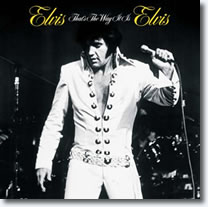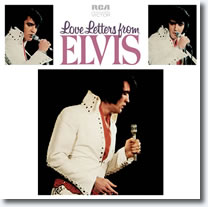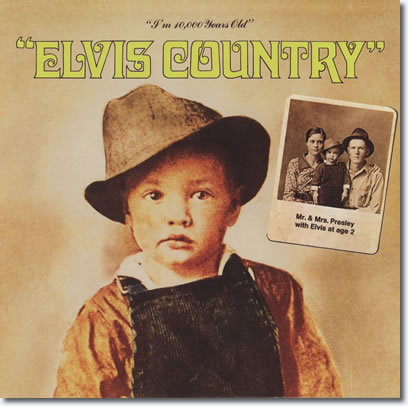Elvis Presleys : Nashville Marathon : June 4-8, 1970
In short, the Nashville sessions had a lot to live up to.
By June 1970, Elvis' comeback was secured. He had achieved four top ten hits on the US singles chart over the previous 12 months, including a number one with 'Suspicious Minds', and his return to live performance in Las Vegas had been a critical triumph, as had his appearances at the Houston Astrodome three months before.
Let's take a look at what Elvis recorded at the Nashville Marathon and who played on the sessions.
Musicians / Technicians
- Guitar: Elvis Presley
- Guitar: James Burton
- Guitar: Chip Young
- Guitar: Charlie Hodge
- Drums: Jerry Carrigan
- Piano: David Briggs
- Bass: Norbert Putnam
- Organ/Harmonica/Marimba: Charlie McCoy
- Engineer: Al Pachuki
- Producer: Felton Jarvis

Top: David Briggs, Norbert Putnam, Elvis Presley, Al Pachuki, Jerry Carrigan.
Bottom: Felton Jarvis, Chip Young, Charlie McCoy, James Burton.
The musicians on the session were entirely different to those on the Memphis sessions and, apart from James Burton on lead guitar, no member of his live band was present either.
The personnel were not unfamiliar however as, apart from Carrigan and Putnam, they had all worked with Elvis before. Putnam had also technically appeared with Elvis before, but only by way of an overdub session for 'Beyond the Reef' in 1968, which Elvis wasn't present at.
Putnam later told Elvis biographer Peter Guralnick how nervous he was about the prospect of working with Elvis: 'I was scared to death. I remember standing in the bathroom looking in the mirror and saying 'Dear God, don't let me be the one to screw up this session. Don't let me be the first guy to ruin it!'
Chip Young had first worked with Elvis on the 1966 sessions that produced the 'How Great Thou Art' gospel album. Briggs' association began at the same session, where he played piano on the single Love Letters. McCoy had done some great work with Elvis on tracks such as Big Boss Man (1967), but began his association less auspiciously as a guitarist on the best forgotten 'Harum Scarum' sessions in 1965. Charlie Hodge was one of Elvis' closest friends and he had appeared on and off at sessions since 1960.
What was recorded?
Elvis and his band recorded 35 masters over the five-day session. The quality of the songs varied, but Elvis' performances were generally excellent, if not quite matching the intensity and polish of the best of the Memphis sessions. Most of the songs found their way on one of three albums:
Elvis arriving at Studio B on June 4, 1970

Elvis arriving at Studio B on June 4, 1970.
June 1, 1970 : a new guardhouse is completed at the Graceland gates : cost $1950. Felton Jarvis quits his job at RCA to work directly for Elvis, not only in the recording studio but in Las Vegas and on the road.
June 4, 1970 : Elvis begins five days of recording at RCA's Studio B in Nashville, reporting each evening at 6.00pm and working until the dawn hours. The decision to follow up the magnificent sessions in Memphis by going back to RCA's Nashville studio and hiring Nashville musicians, must have puzzled quite a few people at the time. However, as Chip Moman's Memphis studio had folded, both RCA and Felton Jarvis must have been pleased to see the situation return to what it had been before - RCA because of administrative differences with Chip Moman, and Jarvis because he would once more be in total control again. Felton Jarvis had quit RCA in the beginning of 1970, and from the June sessions onwards would work for Elvis exclusively, both in the recording studios and with live recordings. ln this capacity Jarvis supervised all the arrangements such as booking studios, hiring musicians, and staying in touch with the various publishing companies and RCA.
Whereas Elvis would be in control during the actual sessions, Jarvis would do all the overdubbing sessions at a later date and see to the forwarding of the master tapes to RCA.
Given the different location and the presence of a different producer, the radical change in sound perhaps did not come as a total surprise. Gone was the soul-imbued Memphis sound, substituted by the slick Nashville country sound. The 1970 band line-up had changed drastically from the one last employed in January 1968.
No longer present were the old timers like Scotty Moore and D.J. Fontana, Bob Moore, Buddy Harman, Pete Drake, Floyd Cramer, Boots Randolph, and The Jordanaires. Of the old crew only Chip Young, David Briggs, and Charlie McCoy were in the studios, Some of the newcomers such as Norbert Putnam on bass and Jerry Carrigan on drums were in the same age group as Young and Briggs.
From Elvis' live band only James Burton took part in the sessions, perhaps because apart from Jerry Reed no lead guitarist of top-notch quality was available in Nashville.
The sessions lasted live nights, and produced a total of no less than 34 recordings. The usual recording procedure was reverted to, with Elvis doing his vocals along with the rhythm track. Unlike the previous Nashville sessions this time a lot of overdubs were made, probably in order to simplify technical proceedings during the actual sessions. All the back-up vocals and such extras as banjo and fiddle parts were recorded during the following months. The saxophone that was so prominent in Elvis' sixties sessions was dropped in the seventies' band, and any horn section work was now dubbed in later. Once again the quality of the material to be recorded presented a problem, and, unfortunately, a great number of mediocre ballads were chosen. Generally, the songs that make up Elvis Country are of a high standard, with Bill Monroe's 'Little Cabin On The Hill' and a great rocker like 'l Washed My Hands ln Muddy Water' being especially impressive. Apart from rock oriented songs like 'Patch It Up' and the medley 'Got My Mojo Working'/ 'Keep Your Hands Off Her' during these sessions rock repertoire, unfortunately, was neglected, not to mention blues or soul oriented repertoire. A definite disadvantage of the overdubbing procedure was Elvis' absence when this work 'was done. As a result, Felton Jarvis' rather traditional concepts became the ruling factor in all the overdubbing and mixing. Jarvis would then submit final mixes to Elvis, who would perhaps occasionally ask for certain changes to be made.
The first day set the tone for what was to follow, with Elvis in a loose mood : as if he might break off into a jam at any moment - but also in strong voice and generally committed to the material.
'I've Lost You' was released as a single and a live and marginally superior version of it appeared on 'That's the Way It Is'. This is a strong song, with adult lyrics that possibly resonated strongly with Elvis - depending on who you believe about the state of his marriage at this time. Although quality material, it wasn't particularly commercial and so peaked at a disappointing number 32 on the US charts.
Elvis had been messing around with The Fool for many years before cutting it for his country album. There's a home recording of him performing this from a decade before. The studio version takes a bluesy approach which is very effective but I always think it might have benefitted from being in a slightly higher key. The same goes for Little Cabin on the Hill, which is the kind of song Elvis had been singing since the 1950s and did actually sing at the famous Million Dollar Quartet session in 1956.
Twenty Days and Twenty Nights is a standout performance from the first day.
Here's the full line-up of tracks for the five days
June 4, 1970 RCA Studio B - Nashville, Tennessee
Mystery Train / Tiger Man (Jam)
Twenty Days & Twenty Nights ZPA4 1593-09
I've Lost You ZPA4 1594-07
I Was Born About Ten Thousand Years Ago ZPA4 1595-01
The Sound Of Your Cry ZPA4 1596-11
Faded Love (Country Version) WPA5 2584-01
The Fool ZPA4 1597-02
A Hundred Years From Now WPA5 2569-SP
Little Cabin On The Hill ZPA4 1598-02
Cindy Cindy ZPA4 1599-03
Elvis in the Studio B parking lot on June 5, 1970

Elvis in the Studio B parking lot on June 5, 1970.
June 5. 1970 RCA Studio B - Nashville, Tennessee
Bridge Over Troubled Water ZPA4 1600-08
Got My Mojo Working / Keep Your Hands Off It ZPA4 1601-01
How The Web Was Woven ZPA4 1602-03
It's Your Baby, You Rock It ZPA4 1603-05
Stranger In The Crowd ZPA4 1604-09
I'll Never Know ZPA4 1605-07
Mary In The Morning ZPA4 1606-05
A real mixed bag here, from the sublime Bridge Over Troubled Water (although better live versions would be recorded) and It's Your Baby, You Rock It, to the rather forgettable I'll Never Know. The 'That's the Way It Is' cuts are all strong songs and very well executed. 'Got My Mojo Working / Keep Your Hands Off It' was from a jam session and breathed some life into the 'Love Letters from Elvis' album.
June 6. 1970 RCA Studio B - Nashville, Tennessee
I Didn't Make It On Playing Guitar (Jam) WPA5 2583-01
It Ain't No Big Thing ZPA4 1607-09
You Don't Have To Say You Love Me ZPA4 1608-03
Just Pretend ZPA4 1609-03
This Is Our Dance ZPA4 1610-11
Life ZPA4 1613-20
Heart Of Rome ZPA4 1614-03
Heart Of Rome ZPA4 1614-03
Heart Of Rome (Work Part) ____-01
Heart Of Rome (Composite) ZPA4 1614-SP
This was the weakest day yet of the session as regards song quality, but two of the songs were worthy of Elvis' time, namely Just Pretend and You Don't Have to Say You Love Me.
As with the previous day's weaker cuts, the remainder (apart from the opening jam) appeared on 'Love Letters from Elvis', which does make this seem like an album for leftovers. You Don't Have to Say You Love Me hit number 11 on the US charts when released as a single, backed with Patch It Up.
 |
|---|
 |
June 7 1970 RCA Studio B - Nashville, Tennessee
June 7, A new idea began taking shape. The original plan to cut just eighteen songs could not have included any thought of a second album, but on the fourth night, all of a sudden, a country album began to emerge.
When I'm Over You ZPA4 1615-01
I Really Don't Want To Know ZPA4 1616-04
Faded Love ZPA4 1617-01
Tomorrow Never Comes ZPA4 1618-13
Tomorrow Never Comes (Work Part) ____-01
The Next Step Is Love ZPA4 1619-11
Make The World Go Away ZPA4 1620-03
Make The World Go Away (Work Part) ____-01
Make The World Go Away (Composite) ZPA4 1620-SP
Funny How Time Slips Away (Remake) ZPA4 1621-01
I Washed My Hand In Muddy Water ZPA4 1622-01
Love Letters ZPA4 1623-05
Elvis Country : Arguably Elvis Presleys Best Album

Elvis Country : FTD Special Edition : Classic Album 2 CD Set.
After a slightly disappointing previous day, there were some top notch performances on June 7. Again the weakest tracks are those which found their way on 'Love Letters from Elvis'. Among these are a remake of Love Letters, which doesn't come close to matching Elvis' original recording from 1966.
The standout track from this day was Tomorrow Never Comes, which builds to a dramatic Roy Orbison-style crescendo - Elvis can even be heard on an outtake jokingly singing the intro to Roy Orbison's Running Scared.
Elvis also really delivers on Willie Nelson's Funny How Time Slips Away and Don Robertson's I Really Don't Want to Know. The latter provided Robertson with his first major success when it was recorded by Eddy Arnold in 1954. It was one of many Robertson compositions recorded by Elvis, including Anything That's Part Of You, There's Always Me, I Met Her Today and I'm Counting On You. The arrangement on It's Funny How Time Slips Away borrows from Ricky Nelson's 1966 version, which appeared on Ricky's great country rock album 'Country Fever'. Both versions feature James Burton's great work on dobro.
June 8. 1970 RCA Studio B - Nashville, Tennessee
There Goes My Everything ZPA4 1624-03
If I Were You ZPA4 1625-09
Only Believe ZPA4 1626-04
Sylvia ZPA4 1627-08
Patch It Up ZPA4 1628-08
The final day of recording didn't reach the heights of the previous day.
There are no bad performances, but the material could have been stronger. There Goes My Everything is perhaps the vocal highlight. Elvis also sings Only Believe very well, but the song is a little ponderous. Patch It Up is a solid performance, but worked better in a live setting at the next Vegas season in August.
Conclusion
It's evident that there was a little less discipline at these sessions than at the previous year's Memphis sessions and maybe a greater tendency to accept lesser material. I think it's fair to say that Elvis simply wasn't as hungry for a hit in June 1970 as he had been in January 1969 and he didn't have a producer who was inclined to challenge him, as Chips Moman had in Memphis. There was also a move away from the 'blue eyed soul' of the American Studio cuts, which had a lot to do with the change of musical personnel. After producing several big hits and one of the best albums of Elvis' career in 'From Elvis in Memphis', it's a real shame that Elvis didn't or wasn't able to work with Chips and the Memphis musicians again. As was too often the case with Elvis' career, there were political factors that took precedence over the business of creating good music.
This is all sounding a little negative though and I don't mean to suggest the five days at Studio B were not fruitful. Some fantastic masters were produced and two of Elvis' best albums of the 1970s. There is much to enjoy, but not tracks that would fall into the 'all time classic' category in the way that Suspicious Minds and In the Ghetto do. What the Nashville Marathon does provide is a real insight into what made Elvis tick musically. He drew on country, R&B, gospel and rock 'n' roll, but all with his personal stamp. Elvis singing country wasn't quite like anyone else singing country. Bassist, Norbert Putnam summed it up well when he said of Elvis:
'I came to understand, he expressed so many things with his voice…He was the greatest communicator of emotion that I ever knew, from beginning to end'.
© Copyright 2024 by www.elvis.com.au & www.elvispresley.com.au
![]() https://www.elvis.com.au/presley/elvis-presleys-nashville-marathon-june-4-8-1970.shtml
https://www.elvis.com.au/presley/elvis-presleys-nashville-marathon-june-4-8-1970.shtml
No part of any article on this site may be re-printed for public display without permission.
 Tupelo's Own Elvis Presley DVD
Tupelo's Own Elvis Presley DVD
Never before have we seen an Elvis Presley concert from the 1950's with sound. Until Now! The DVD Contains recently discovered unreleased film of Elvis performing 6 songs, including Heartbreak Hotel and Don't Be Cruel, live in Tupelo Mississippi 1956. Included we see a live performance of the elusive Long Tall Sally seen here for the first time ever. + Plus Bonus DVD Audio.
This is an excellent release no fan should be without it.
The 'parade' footage is good to see as it puts you in the right context with color and b&w footage. The interviews of Elvis' Parents are well worth hearing too. The afternoon show footage is wonderful and electrifying : Here is Elvis in his prime rocking and rolling in front of 11.000 people. Highly recommended.
Tupelo's Own Elvis Presley DVD Video with Sound.





